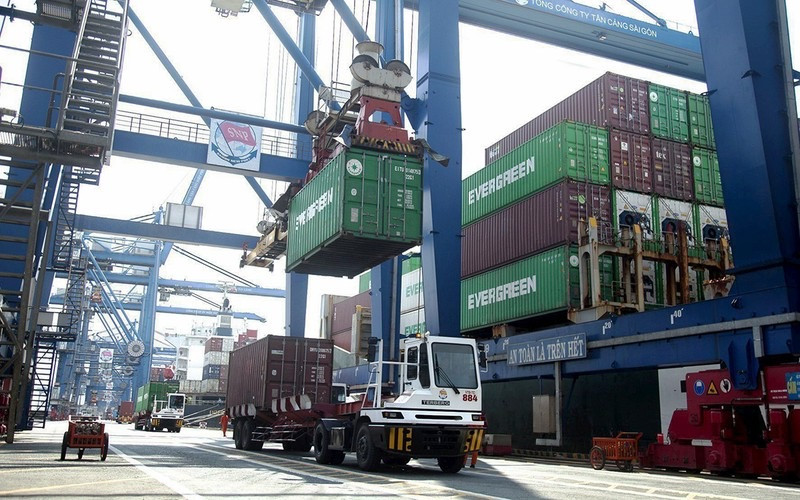Logistics enterprises are gradually participating more actively in supporting the production and circulation of goods throughout the country, including export and import activities.
In the context of being affected by the COVID-19 pandemic, logistics enterprises have shown an important role in promoting production and business, contributing to the implementation of new generation free trade agreements (FTAs).
Vietnam’s freight volume increased by 17.4% between 2017 and 2021, from 1.38 billion tonnes to 1.63 billion tonnes. In 2022, the total volume of freight transport was estimated at more than 2 billion tonnes, an increase of 23.7% compared to 2021.
According to Deputy Director of the Import-Export Department under the Ministry of Industry and Trade Tran Thanh Hai, after more than 5 years of implementing Decision No.200/QD-TTg, awareness and views on the role and potential development of the logistics service industry have been enhanced at all levels.
This is clearly shown in a series of guidelines, regulations and policies issued to create a legal corridor and an open and healthy business environment, to promote the sustainable development of logistics activities.
During the 2017-2022 period, the logistics infrastructure system and transport infrastructure were also invested in to develop quickly and effectively; many large and modern projects have been put into operation.
The focus on investment and development of key transport infrastructure has contributed to the rational restructuring of the transport sector, ensuring a harmonious connection and promoting the strengths of each mode of transport, thereby enhancing the competitiveness of the economy.
Currently, domestic logistics enterprises account for about 89%, joint venture enterprises account for about 10%; the remaining 1% are foreign enterprises providing transnational logistics services with big names in the list of the 50 largest logistics companies in the world, such as DHL, Kuehne + Nagel, DSV, DB Schenker, etc.
According to the Vietnam Logistics Business Association (VLA), several Vietnamese enterprises such as Transimex, Sotrans, and Saigon Newport, have become large logistics businesses, providing 3PL services, enough to compete with foreign enterprises and have branches or representatives in many markets around the world. As of December 30, 2022, VLA admitted an additional 128 members, bringing its total membership to 659.
Vietnamese enterprises mainly provide domestic logistics services, including domestic transportation, forwarding, warehousing, customs procedures, and goods inspection. Compared to foreign enterprises, Vietnamese enterprises are holding large infrastructure and assets for logistics activities, and at the same time have the advantage of understanding business practices and domestic customers, but financial and management capacity is still limited, serving only in certain segments, and lacking a seamless connection to provide integrated logistics services.
To support enterprises to improve their competitiveness and develop logistics services in the coming time, first of all, opening up the logistics market is very necessary, creating conditions for Vietnamese enterprises to quickly rise and catch up with the development level of the world.
Ministries, sectors, localities and businesses also need to focus on promoting the training of logistics human resources at all levels, especially high-quality human resources, fully equipped with the necessary knowledge and skills.
In addition, it is necessary to accelerate the digital transformation process, apply information technology to create breakthroughs, improve competitiveness, and reduce costs.
VLA Standing Vice Chairman Dao Trong Khoa suggested that the Government direct relevant ministries and sectors to support the logistics industry, with capital to develop technology and digital transformation, within the framework of the national action program on logistics.
















